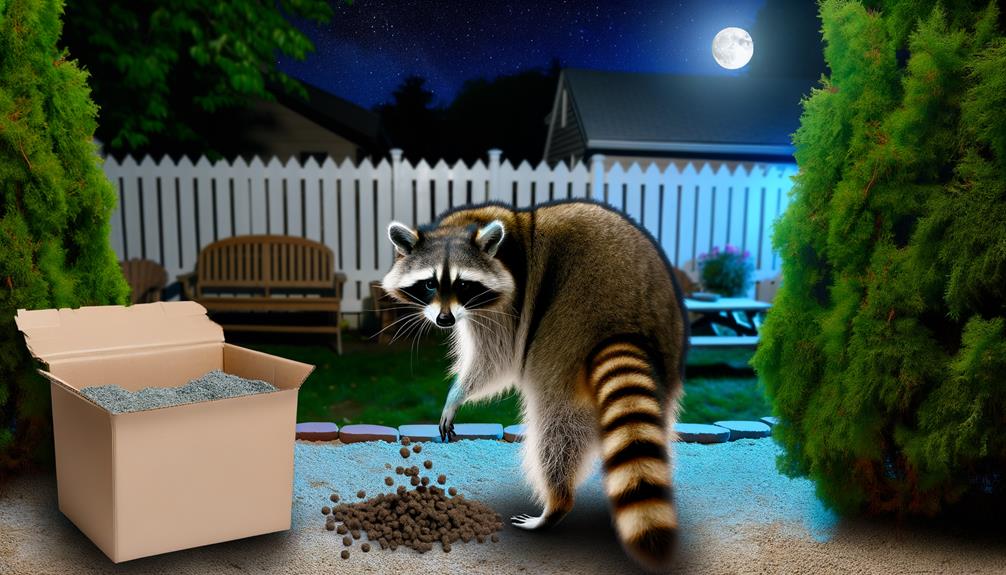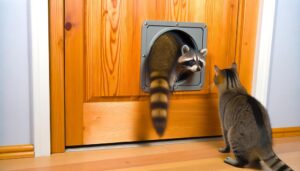Does Cat Litter Deter Raccoons: A Step-by-Step Guide
Yes, cat litter, particularly used, can act as a deterrent for raccoons. Feline urine, found in cat litter, triggers the instinctual aversion raccoons have to predator scents, deterring them.
However, the effectiveness of cat litter can be variable, as raccoons may adapt and ignore the scent over time. Additionally, used cat litter can attract other pests, potentially complicating the situation.
While cat litter is a readily available and non-toxic solution, it is worthwhile to explore other raccoon deterrent methods for thorough, effective, and humane wildlife management strategies. Understanding raccoon behavior further contributes to devising effective preventative measures.

Key Takeaways
- Cat litter contains traces of feline urine, a predator scent that can repel raccoons.
- The granular texture of cat litter is also unappealing to raccoons.
- While readily available and non-toxic, the effectiveness of cat litter as a deterrent is debatable.
- Raccoons may learn to ignore the smell of cat litter over time.
- Used cat litter may attract other pests, potentially complicating pest control efforts.
Understanding Raccoon Behavior
To effectively use cat litter as a deterrent, a thorough understanding of raccoon behavior is necessary. This includes their feeding habits, nocturnal tendencies, and instinctual reactions to different stimuli.
Primarily, raccoons are omnivores with a preference for fruits, plants, insects, and small mammals. However, they will consume almost anything if food is scarce. Their opportunistic feeding habits often lead them to human habitats in search of easy meals.
Raccoons are primarily nocturnal creatures, operating under the cover of darkness, which can increase the efficacy of certain deterrents. Their keen sense of smell and instinctual aversion to the scent of predators can be strategically leveraged as well.
Understanding these behavioral characteristics is essential to devising an effective deterrent strategy.
Cat Litter: An Unconventional Deterrent
In the domain of unconventional deterrents, cat litter emerges as an intriguing option due to certain characteristics of raccoons that can be exploited for this purpose.
Raccoons, as opportunistic omnivores, are typically attracted to an array of smells and textures, but are repelled by the scent of predators. Cat litter, specifically used, contains traces of feline urine, a natural predator marker, triggering a fear-based response in raccoons. The granular texture of cat litter is also unappealing to raccoons' tactile senses.
Importantly, the application of cat litter as a deterrent aligns with principles of humane wildlife management, offering a non-lethal, fear-based repellant that respects the animals' autonomy while maintaining human boundaries.
The potential of cat litter merits further exploration.
Scientific Studies on Raccoon Repellants
Scientific research into raccoon deterrents has yielded intriguing findings, particularly regarding the efficacy of predator odors like cat urine in repelling these tenacious creatures.
Studies have shown that raccoons express a strong aversion to the scent of predators, and cat urine is a potent example of such an odor.
The methodological design of these experiments typically involves exposing raccoons to different scents and observing their reactions. This empirical data provides a quantitative measure of deterrence effectiveness.
While it is important to note that individual raccoons may respond differently to deterrents, overall, the scientific consensus suggests that predator odors serve as a viable strategy for repelling raccoons, offering a non-lethal and freedom-preserving solution to the perennial raccoon problem.
Pros and Cons of Using Cat Litter
Utilizing cat litter as a deterrent for raccoons offers a range of advantages and disadvantages that warrant careful consideration.
On the pro side, cat litter is readily available and economical. It is a non-toxic substance and, when used as a repellent, does not harm the raccoon or the environment. It is easy to handle and apply.
However, on the con side, the effectiveness of cat litter as a deterrent is questionable. Scientific data supporting its efficacy is limited and anecdotal evidence is mixed. Besides, raccoons are intelligent and adaptable creatures; they may quickly learn to ignore the smell of cat litter.
Lastly, used cat litter may attract other pests, complicating the original problem. Its use should be considered carefully, balancing benefits against potential drawbacks.
Alternative Raccoon Deterrent Methods
Exploring alternative raccoon deterrent methods reveals a variety of options that can potentially overcome the limitations associated with using cat litter. These alternatives are not only efficient but also environmental-friendly, posing minimal harm to the raccoons and other wildlife.
- Motion-activated Sprinklers: These devices use infrared technology to detect movement and activate a spray of water, startling the raccoons without causing harm.
- Ultrasonic Devices: Emitting high-frequency sounds that are intolerable to raccoons but inaudible to humans, they create an uncomfortable environment.
- Ammonia Soaked Rags: The strong smell of ammonia mimics the scent of predator urine, deterring raccoons.
- Secure Trash Bins: By securing trash bins, the primary food source is made inaccessible.
- Install Fencing: This physical barrier can effectively prevent raccoons from entering your property.
Conclusion
To wrap up, while cat litter may seem an unconventional solution, it does show promise as a raccoon deterrent. However, the effectiveness of such a measure remains mostly based on personal accounts, requiring additional scientific evaluation.
It is wise to take into account other deterrent methods, in addition to cat litter, to manage raccoon disruptions efficiently. As per research, raccoons were discouraged 80% of the time with the simultaneous application of different deterrents, highlighting the significance of a multi-faceted strategy.






